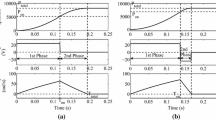Abstract
Experience mapping based predictive controller (EMPC) is a recently developed controller based on the concepts of Human Motor Control. It has been demonstrated to out-perform other classical controllers like proportional-derivative (PD), model reference based adaptive controller (MRAC), linear quadratic regulator (LQR) and the linear quadratic Gaussian (LQG) for both Type-1 and Type-0 systems. This paper analyses the stability and efficiency of EMPC for Type 1 systems. EMPC uses rectangular pulse input as control action for well-damped Type 1 systems and a first order decay input for under-damped Type 1 systems . The simulation results of EMPC for position control of a DC motor with a load coupled through a flexible shaft are presented as a case study to derive and prove the stability criterion. The efficiency of EMPC on a practical system is analysed in terms of energy dissipated in the armature resistance of the motor and the same is compared with PD, MRAC, LQR, LQG controller. Further, the computational cost of EMPC is discussed and compared with traditional controllers from the point of view of implementation.












































Similar content being viewed by others
References
Wu G-Q, Wu S-N, Bai Y-G, Liu L (2013) Experimental studies on model reference adaptive control with integral action employing a rotary encoder and tachometer sensors. Sensors 13:4742–4759
Bature AA, Muhammad M, Abdullahi AM (2013) Position control of a DC motor: an experimental comparative assesment between fuzzy and state feedback controller. ARPN J Eng Appl Sci 8:984–987
Sahin M, Bulbul H, Colak I (2012) Position control of a DC motor used in solar panels with artificial neural network. In: 2012 11th international conference on machine learning and applications (ICMLA), vol 2, pp. 487-492
Sastry S, Bodson M (2011) Adaptive control:stability, convergence and robustness. Courier Corporation
Shin H-C, Choi S-B (2011) Position control of a two-link flexible manipulator featuring piezoelectric actuators and sensors. Mechatronics 11:707–729
Liu YE, Skormin VA, Liu Z (2002) Experimental comparison on adaptive control schemes. In: Proceedings of the 27th IEEE conference on decision and control
Ruderman M, Krettek J, Hoffmann F, Bertram T (2008) Optimal state space control of dc motor. In: Proceedings of the 17th world congress the international federation of automatic control, pp 5796–5801
Yu G-R, Hwang R-C (2004) Optimal PID speed control of brushless DC motors using LQR approach, systems, man and cybernetics. In: 2004 IEEE international conference, vol 1, pp 473–478
Syahidah W, Rosli O, Joraimee MA, Norhidayah A (2014) Linear quadratic gaussian (LQG) Controller design for servo motor. Aust J Basic Appl Sci 8:700–713
Iwasaki T, Kataoka T (1989) Application of an extended kalman filter to parameter identification of an induction motor. In: Industry applications society annual meeting, 1989., conference record of the 1989 IEEE, pp 248–253
Aravind MA, Niranjan S, Dinesh NS, (2017) Optimal position control of a DC motor using LQG with EKF. In: 2017 international conference on mechanical, system and control engineering (ICMSC)
Chen CL, Feng G, Guan XP (2005) Delay-dependent stability analysis and controller synthesis for discrete-time fuzzy systems with time delays. IEEE Trans Fuzzy Syst 13(5):630–643
Han Q-L (2009) Improved stability criteria and controller design for linear neutral systems. Automatica 45:1948–1952
Saikumar N, Dinesh NS, (2012) Position control of DC motors with experience mapping based prediction controller. In: IECON, pp 2394 - 2399
Saikumar N, Dinesh NS, (2012) A study of experience mapping based prediction controller for position control of DC motors with inertial and friction load changes. In: 7th IEEE international conference on industrial and information systems
Saikumar N, Dinesh NS (2014) A study of bipolar control action with EMPC for the position control of DC motors. Int J Dyn Control 4:154–166
Saikumar N, Dinesh NS, Kammardi P (2015) Experience mapping based prediction controller for the smooth trajectory tracking of DC motors. Int J Dyn Control 5:704–720
Raghu CV, Dinesh NS, (2017) DC motor speed control using experience mapping based prediction controller (EMPC). In: 3rd international conference on control, automation and robotics (ICCAR)
Raghu CV, Dinesh NS (2017) EMPC for DC motor based tracking applications. In: IEEE 3rd international symposium in robotics and manufacturing automation (ROMA)
Aravind MA, Dinesh NS, Rajanna K (2017) Application of EMPC for under-damped type-1 systems. In: 3rd international conference on control, automation and robotics (ICCAR)
Aravind MA, Dinesh NS, Rajanna K (2018) Adaptive experience mapping based predictive controller for under-damped type 1 systems. Int J Dyn Control, pp 1–18, Springer, Berlin
Flanagan JR, Vetter P, Johansson RS, Wolpert DM (2003) Prediction precedes control in motor learning. Curr Biol 13:146–150
Ungerleider L, Doyon J, Karni A (2002) Imaging brain plasticity during motor skill learning. Neurobiol Learn Mem 78:553–564
Brashers-Krug T, Shadmehr R, Bizzi E (1996) Consolidation in human motor memory. Nature 382:252255
Shadmehr R, Holcomb HH (1997) Neural correlates of motor memory consolidation. Science 277:821825
Author information
Authors and Affiliations
Corresponding author
Rights and permissions
About this article
Cite this article
Aravind, M.A., Saikumar, N., Dinesh, N.S. et al. Stability analysis and efficiency of EMPC for Type-1 systems. Int. J. Dynam. Control 7, 452–468 (2019). https://doi.org/10.1007/s40435-018-0461-8
Received:
Revised:
Accepted:
Published:
Issue Date:
DOI: https://doi.org/10.1007/s40435-018-0461-8




